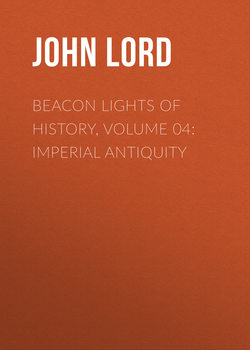Beacon Lights of History, Volume 04: Imperial Antiquity

Реклама. ООО «ЛитРес», ИНН: 7719571260.
Оглавление
John Lord. Beacon Lights of History, Volume 04: Imperial Antiquity
CYRUS THE GREAT
AUTHORITIES
JULIUS CAESAR
AUTHORITIES
MARCUS AURELIUS
AUTHORITIES
CONSTANTINE THE GREAT
AUTHORITIES
PAULA
AUTHORITIES
CHRYSOSTOM
AUTHORITIES
SAINT AMBROSE
AUTHORITIES
SAINT AUGUSTINE
AUTHORITIES
THEODOSIUS THE GREAT
AUTHORITIES
LEO THE GREAT
AUTHORITIES
Отрывок из книги
One of the most prominent and romantic characters in the history of the Oriental world, before its conquest by Alexander of Macedon, is Cyrus the Great; not as a sage or prophet, not as the founder of new religious systems, not even as a law-giver, but as the founder and organizer of the greatest empire the world has seen, next to that of the Romans. The territory over which Cyrus bore rule extended nearly three thousand miles from east to west, and fifteen hundred miles from north to south, embracing the principal nations known to antiquity, so that he was really a king of kings. He was practically the last of the great Asiatic emperors, absorbing in his dominions those acquired by the Assyrians, the Babylonians, and the Lydians. He was also the first who brought Asia into intimate contact with Europe and its influences, and thus may be regarded as the link between the old Oriental world and the Greek civilization.
It is to be regretted that so little is really known of the Persian hero, both in the matter of events and also of exact dates, since chronologists differ, and can only approximate to the truth in their calculations. In this lecture, which is in some respects an introduction to those that will follow on the heroes and sages of Greek, Roman, and Christian antiquity, it is of more importance to present Oriental countries and institutions than any particular character, interesting as he may be,–especially since as to biography one is obliged to sift historical facts from a great mass of fables and speculations.
.....
Cyaxares the Median meanwhile raised up in Ecbatana a rival power to that of Babylon, although he devoted himself to warlike expeditions more than to the adornment of his capital. He penetrated with his invincible troops as far to the west as Lydia in Asia Minor, then ruled by the father of Croesus, and thus became known to the Ionian cities which the Greeks had colonized. After a brilliant reign, Cyaxares transmitted his empire to an unworthy son,–Astyages, the grandfather of Cyrus, whose loss of the throne has been already related. With Astyages perished the Median Empire, which had lasted only about one hundred years, and Media was incorporated with Persia. Henceforth the Medes and Persians are spoken of as virtually one nation, similar in religion and customs, and furnishing equally the best cavalry in the world. Under Cyrus they became the ascendent power in Asia, and maintained their ascendency until their conquest by Alexander. The union between Media and Persia was probably as complete as that between Burgundy and France, or that of Scotland with England. Indeed, Media now became the residence of the Persian kings, whose palaces at Ecbatana, Susa, and Persepolis nearly rivalled those of Babylon. Even modern Persia comprises the ancient Media.
The reign of Cyrus properly begins with the conquest of Media, or rather its union with Persia, B.C. 549. We know, however, but little of the career of Cyrus after he became monarch of both Persia and Media, until he was forty years of age. He was probably engaged in the conquest of various barbaric hordes before his memorable Lydian campaign. But we are in ignorance of his most active years, when he was exposed to the greatest dangers and hardships, and when he became perfected in the military art, as in the case of Caesar amid the marshes and forests of Gaul and Belgium. The fame of Caesar rests as much on his conquests of the Celtic barbarians of Europe as on his conflict with Pompey; but whether Cyrus obtained military fame or not in his wars against the Turanians, he doubtless proved himself a benefactor to humanity more in arresting the tide of Scythian invasion than by those conquests which have given him immortality.
.....